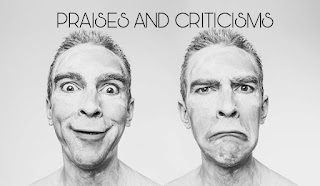Good Morning Brilliant and Excellent People,
I look forward to sharing with you Brilliant and
Excellent tips for attaining your goals and fulfilling your Purpose.
As a member of the high school football team,
when we go for matches in other schools, one of the factors that
determines winning or losing was the crowd support. We hear the cheers from the
crowd, some motivating us which usually is from our small team of supporters
and there’s a larger noise booing us, mostly from the opponent’s side.
Along
with our own preparedness, whichever one we choose to react to mostly
determines the outcome of the game. When we listened to the ‘boos’ and reacted
to it, we started to have poor outcome, but when we listened to the small voices
of cheers in the crowd, we were motivated and encouraged to do better.
Even
when we made mistakes and our team of supporters started to boo us, reacting to
that too also altered the level of confidence we might have had to win the
game.
Moving on in my career path, I have realized
how the experience of the football team translate into every other aspect of
our lives especially at work. I have seen employee performance decline greatly because of criticism and negative
feedback, and I have also seen employee output increased greatly in spite of criticism and negative
feedback.
This brought me finally to one conclusion, that it was not merely
the criticism and or praises that affects your performance, it is how you
respond to it that does.
Your response can change everything. It can
mean worrying less about negative feedback and critics, it can mean integrating
yourself to receiving praises/critics and filtering it through the eyes of your
expectations and preferences. It can mean greater productivity because you see
the areas you need to improve on through the eyes of other people, but just
waiting on the praises and criticism as a way forward is not a good sign of
emotional intelligence.
Balancing
Criticism and Praise
It is expected that when an employer constantly
praise and commend his/her employee’s work, output should increase, however,
latest research indicates that “Rewarding people with praise isn't going to
make them perform any better…” Charles S. Jacobs (Management Rewired).
Neither
will criticism, as a matter of fact, criticism results in a much stronger emotion
than praises, that is, continuous criticism will produce unmotivated staffs and
a higher turnover. However the timeliness of the feedback is very important,
when you learn to give praises at appropriate times and often, it encourages a
better reaction to criticism as there is a better understanding of such
criticism.
More often than not, our society makes us
dependent on praise and avoidance of criticism. It’s seen as though the praise
in itself is an approval and a sign that whatever it is you’re up to is
absolutely wonderful. In reality, this is not the case. Feedback have their
place in the professional scene, whether it’s praise or reproach.
Praises makes us see how good we have done,
criticism makes us see how good we need to do, it all depends on how you look
at it.
The
receiving end: how you chose to respond affects everything
It can be difficult receiving negative
feedback, it doesn’t matter who is now giving it, there is a strong tendency
to think of the person as the enemy and take the feedback as an attack on our
personality, and that is why emotional intelligence is very importance.
Here are some of the best tips to responding differently:
Think
before you say anything: Our first response is to be
defensive and find an excuse when it comes to criticism or to be easily
entreated when we are being praised. In both situations, think and evaluate
what is being said before reacting.
Focus
on the message and not the messenger: When
we recognize that we can learn from that feedback and focus on the message, it
changes our perspective of the feedback as a means of improvement and not as a
personal attack
Determine
the motive: Some people want to give feedbacks without
your best interest. They do so either to receive favours or as a result of
deception. Sit back and analyse the feedback you just got, what is it saying?
How is it being said? Some feedback are merely opinions and is not worth
another minute, some feedbacks are aimed at your improvement and some feedbacks
are said to spite you. Determine the
motive and respond appropriately but with courtesy.
You can get more BPE tips @ www.solomonempire.com or download the BPE tool app on google play store.



No comments:
Post a Comment